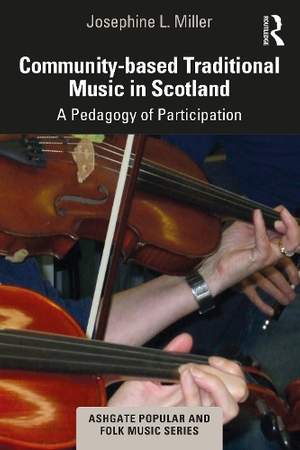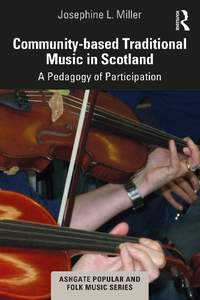
Community-based Traditional Music in Scotland: A Pedagogy of Participation
- Author: Miller, Josephine L.
Book
$169.00Printed on demand
Contents
- List of Figures
- List of Music Examples
- Acknowledgements
- Preface
- Learning and teaching traditional music: Refocusing the questions
- Introduction
- Transmission and enculturation
- 'Traditional' music
- Community-based settings
- A 'non-formal' setting?
- Communities of practice
- Masters and apprentices
- Family
- Oral tradition and music literacy
- Socialisation
- Researching the case study
- Methods and ethics
- Notes
- 'A passport into a community': Setting the scene
- Learning and teaching: the revival and post-revival contexts
- Learning and teaching: formal education
- 'Take off': community-based organisations
- Introducing Glasgow Fiddle Workshop
- Locality: a sense of place
- Introducing the tutors
- GFW in a stylistic community of practice
- Notes
- 'I'm a better learner now': In the class
- Joining a class
- Learning the shared skills
- Learning and teaching a tune
- The role of listening
- Playing it through
- Varying, ornamenting and arranging tunes
- Dealing with notation
- Choosing repertoire
- Notes
- 'Actually doing it': Participating in performance
- Participation or presentation?
- GFW sessions
- Slow session and pre-class warm-up
- Prepare for the pub
- Very slow session
- Islay Inn session
- Concerts
- Ceilidh dances
- Member-led groups
- Notes
- 'You can make it your own': Individual musical trajectories and organisational constraints
- Encouraging agency at GFW
- Self-directed learning
- Making progress: reflecting on learning
- 'Expressing' the tune
- 'Learners' and 'musicians'
- Music as leisure and levels of involvement
- Non-participation and dissent
- Musical trajectories beyond GFW
- Notes
- 'A sense of who we are': Creating a musical identity
- A GFW identity
- A community-based identity
- A traditional music identity
- Tensions and boundaries: 'who we are' vs. 'who we are not'
- Notes
- Community-based learning and teaching: Towards a pedagogy of participation
- Learning and teaching traditional music in a post-revival landscape
- The ethos of the 'community-based' organisation
- Repertoire
- Tutors
- Learning and teaching practices: between participatory ethos and individual musical trajectory
- Conclusion: A pedagogy of participation



